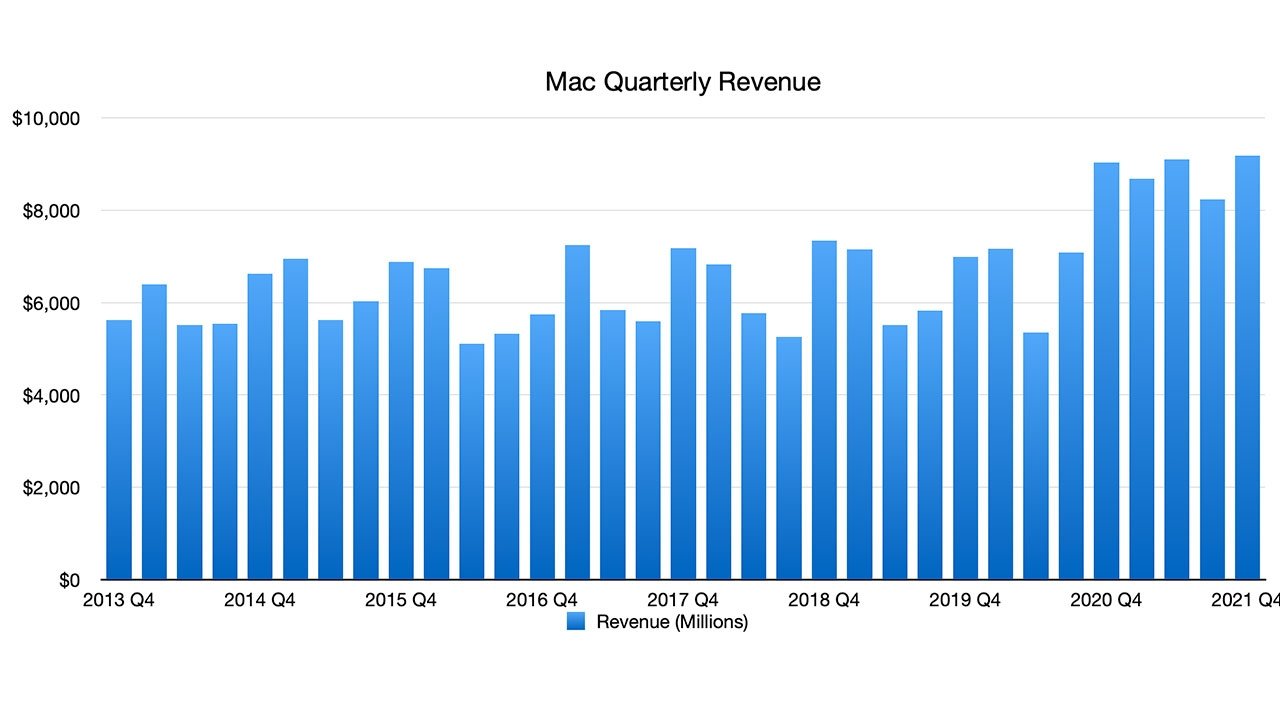Apple Silicon drives year of record-breaking Mac revenue
Apple's in-house chip designs are behind a renaissance for Mac, with M1-powered hardware like MacBook Pro leading the way in a year of consecutive quarterly revenue records for the hardware category.

During Apple's quarterly earnings conference call for the fourth fiscal quarter of 2021, CFO Luca Maestri said Mac's trailing five quarters have been the line's best. Apple Silicon played an integral role in that success.
For the fourth quarter, Mac generated $9.1 billion in revenue for Apple, up 1.6% year-over-year. Maestri credited the performance to strong demand for the MacBook Air.
Apple debuted the first M1 Macs in November 2020, introducing revamped versions of the 13-inch MacBook Pro, MacBook Air and Mac mini. The 24-inch iMac transitioned to Apple Silicon in April of this year and was followed this month by redesigned 14- and 16-inch MacBook Pro models packing next-generation M1 Pro and M1 Pro Max chips.
Just prior to the release of its first batch of Apple Silicon Macs, Apple set an all-time record for Mac revenue in the fourth quarter of 2020. The segment rose dramatically to $9 billion for the three-month period ending in September of that year, up from $6.99 billion in 2019. Mac revenue has maintained momentum over the past year, bucking the usual seasonal declines and powering through supply chain woes.
Sales revenue hit $8.67 billion in the first quarter of 2021, $9.1 billion in the second and $8.2 billion in the third. The most recent quarter's performance holds the line and ekes out an all-time high for Apple's computer lineup.
Looking ahead, Apple anticipates supply chain constraints will have a bigger impact on overall earnings going into the first quarter of 2022, but expects revenue to rise across all product categories aside from iPad. The company's tablet line is predicted to face severe headwinds from component shortages.
If current stock-outs of the new 14- and 16-inch MacBook Pros are any indication of segment strength, however, Mac is in for another record quarter.
Read on AppleInsider

During Apple's quarterly earnings conference call for the fourth fiscal quarter of 2021, CFO Luca Maestri said Mac's trailing five quarters have been the line's best. Apple Silicon played an integral role in that success.
For the fourth quarter, Mac generated $9.1 billion in revenue for Apple, up 1.6% year-over-year. Maestri credited the performance to strong demand for the MacBook Air.
Apple debuted the first M1 Macs in November 2020, introducing revamped versions of the 13-inch MacBook Pro, MacBook Air and Mac mini. The 24-inch iMac transitioned to Apple Silicon in April of this year and was followed this month by redesigned 14- and 16-inch MacBook Pro models packing next-generation M1 Pro and M1 Pro Max chips.
Just prior to the release of its first batch of Apple Silicon Macs, Apple set an all-time record for Mac revenue in the fourth quarter of 2020. The segment rose dramatically to $9 billion for the three-month period ending in September of that year, up from $6.99 billion in 2019. Mac revenue has maintained momentum over the past year, bucking the usual seasonal declines and powering through supply chain woes.
Sales revenue hit $8.67 billion in the first quarter of 2021, $9.1 billion in the second and $8.2 billion in the third. The most recent quarter's performance holds the line and ekes out an all-time high for Apple's computer lineup.
Looking ahead, Apple anticipates supply chain constraints will have a bigger impact on overall earnings going into the first quarter of 2022, but expects revenue to rise across all product categories aside from iPad. The company's tablet line is predicted to face severe headwinds from component shortages.
If current stock-outs of the new 14- and 16-inch MacBook Pros are any indication of segment strength, however, Mac is in for another record quarter.
Read on AppleInsider

Comments
Instead of making a tv show about a computer game studio, maybe apple should make a computer game studio. The only reason not to is out of pity for intel
Apple does not make specific comments about models. Remember that they stopped providing unit shipment numbers a while ago.
Even when they did, they reported Mac sales as a combined unit total across all product family lines; they did not break down by product categories (e.g., desktops, notebooks), product family (e.g., MacBook Air or iMac) nor by individual model.